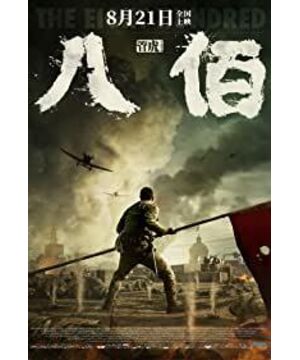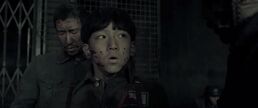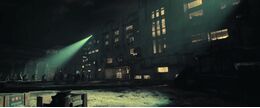As a military film, it is not a qualified war film without the background and deployment of Jinyuan. It is not enough to explain the arduousness of the eight hundred warriors guarding the warehouse. Only emphasizing the will to war and the spirit of nationalism cannot explain the success of guarding the warehouse, nor can it tell the core of the story. The weakening of the core of the story also reduces the value of the movie by half.
In the 1977 version, the background of the Japanese army's attack on Shanghai was laid before, and it also explained the reason and value of why Xie Jinyuan was in the warehouse. In this version, the reason for defending the warehouse was only mentioned at the end of the film when the special commissioner came, and Xie Jinyuan Won's statement about acting is actually disappointing. In fact, he was willing to stick to the warehouse, which should have paved the way before, instead of suppressing the sublimation of the story later. It is a work that should be cultivated and sublimated, and cold water was poured at the end.
In addition, this version of Xie Jinyuan is not like the image of a soldier with flesh and blood. Xie Jinyuan in this version is not a flesh-and-blood father and husband, but a flat soldier who lacks enough realism. A soldier with flesh and blood should not be a mask. First of all, he must have primitive feelings of humanity.
To be able to stick to the Sixing Warehouse for so long, it is necessary to have a rigorous defense strategy. Xie Jinyuan has reason, calmness and strategy. In this version, he is clearly unqualified. There are minefields outside the warehouse, but no minefields can be seen in play. There were also no traps set up outside the warehouse to allow the Japanese to easily reach the warehouse. The cutting-edge working hours tunnels are very close to the Japanese, and they have not seen any effect. The advantage is that there is no lookout post. The Japanese came in and realized the defense. The Japanese can easily come in through the sewers, why didn't they block it beforehand to kill so many people in vain. After the Japanese were defeated, they should not make up their guns and make up their knives, but let the Japanese easily break and lose soldiers. He said he wanted to catch the live ones, but he didn't use them as hostages or spy on intelligence, and let a squad leader kill prisoners of war. I didn't see where Xie Jinyuan's power was.
The most depressing thing is that he actually called everyone to rush the bridge when he finally dashed. In the climax at the end of the 1977 version, Xie Jinyuan still maintained his superb commanding art, demanding that the Japanese army's lights be destroyed, firepower suppressed, important German machinery and equipment be taken away completely, and there was a plan to evacuate in batches. Forgot to name, military discipline is strict, and the climax is the scene of Xie Jinyuan and his wife's family reuniting on loan at last.
In addition to the well-known reasons, the cause of Xie Jinyuan's flatness is that too many little characters grab too many scenes. This is the director's shooting angle. It is different from the main theme of Wanwan in 1977. In order to avoid policy risks, we have to start from small people, and from small people's portraits to the height of nationalism. The idea is very good, but it is very real. difficult. Why? Because the relationship and dialogue between the little characters are more subjectively arranged by the director, the traces are too obvious. In particular, not many people fully interpret the temperament of soldiers. Most of the real soldiers are fighting, and they rarely talk and play, and the most plays are children, deserters, and melons. So that on the whole, the real Eight Hundred Warriors were not reflected, but were robbed by some supporting roles. With acting skills, but without the soul of a soldier. The Sixing Warehouse not only needs exquisite command of defense, but also needs good equipment and personnel quality, and this version does not see the military quality of people, and it is more about the national mood after the transformation. This is not my favorite style. Military films should at least be rigorous, not purely artistic.
In addition to the people in the warehouse, the description of many small characters in the concession also makes the process of character change illogical. The casino punk thinks he can run fast, but if he can succeed, he can run fast, and he is more good at finding barriers. The owner of the casino, and many people use the back view. If they don't understand the communication between relatives, they like the back view so much, so they can't say it face to face. There are also dancers, opera singers, and foreign soldiers who also feel embarrassed. If the portraits are difficult to control, it is better to cut in from the perspective of a small person, and then look for the relationship between other characters to form a relationship, and such a flat, even subdivision processing, it is difficult not to distract the audience. It is also worth mentioning that the embarrassing imitation of local accents by the actors is not pure, and it would be better if they were all in Mandarin. In recent years, I have heard more and more dialectization of domestic movie lines, and it has become more and more embarrassing. It is better not to. Reading good lines and telling good stories is more important than imitating awkward dialects.
Sleepy, in addition to many awkward rival scenes, there is also a dull sense of rhythm and atmosphere. War films are often full of suddenness and danger, but in this film, it feels more calm and lacks a sense of substitution. The Japanese attack seems to be a sporadic attack. I have not seen any particularly successful tactics by the Japanese. They only talk about the bravery and cruelty of the Japanese soldiers, but do not mention the tactical attack and defense, and military pressure. The warehouse is too simplistic. What is especially eye-catching is that the Japanese brigade commander said that he was going to compete with you tomorrow. Of course, as a Chinese regiment commander, he accepted it, but he retreated without seeing the process of the showdown. strangeness.
Speaking of Girl Scouts. Although the Girl Scout story is mythical, he is also an iconic event. Hua Mulan joins the army, and she is not allowed to be a man, and it can better reflect the courage of the Chinese people. I think it is an important part of embodying women's rights. It's a pity that in this version, the Girl Scouts send the flag itself is a task, but no one said what the purpose of sending the flag is. In fact, the Scout is under the command of the superior and has nothing to do with the casino underworld, and he actually went, Did not see any organization. The Girl Scouts themselves did not set up her own background and personality. They deliberately shot the scenes where she watched and stared in a daze many times, and did not reveal the reason for her change, not even mentioning her name, telling the audience all the time that this was the director's subjective shot. This version of the Scouts looks pure and sweet in terms of acting skills and temperament, but they don't have the chivalrous temperament of Brigitte Lin. There is a huge gap. The filming is also too sloppy, sending the flag itself is a dangerous task, but it is not vividly reflected in the film, and Brigitte Lin's version is a depiction of crisis, which makes people's voice immersive, not as tasteless as this version.
Also, the screenwriter made some mistakes. That timid staff officer is not a settler, the staff officer is a soldier, which is not in line with the attempt. The white horse imitates the white tiger style, and it has a romantic color, but this subjective romanticism and Zhao Yun's imaginative lens make the story that is very broken in itself even more broken and unlikable.
Of course, the 1977 version of the main theme of Wanwan is very technically different from this version, mainly because of the technical gap. Especially the front part of the 77 version of the flag guard, in order to show the huge casualties, multiple repeated shots were used, and the fireworks effect was very different. But in terms of narrative and character characterization, it is much higher than this, and it can truly explain the danger of war and the three-dimensional characters. Both versions have tear jerking ingredients, but I prefer the version they sing.
View more about The Eight Hundred reviews











